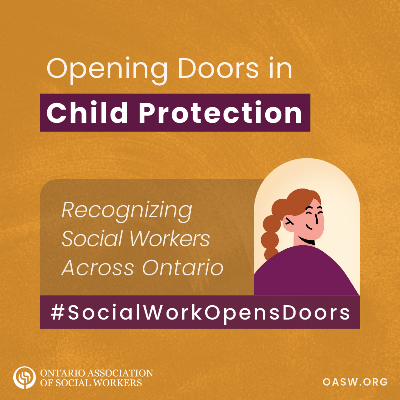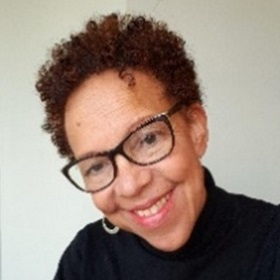
CWICE Celebrates Social Work Month 2024

In Ontario, March 4 to 10 is recognized as Social Work Week. Across Canada, March is National Social Work Month. This year, the theme is “Social Work Opens Doors”, with a focus on the essential work of social workers across many fields of practice and roles.
The Ontario Association of Social Workers says the theme “Speaks to the many ways that social workers help to create new and empowering pathways and opportunities for the people they support. From providing direct mental health services, to helping people navigate complex systems and challenges, and connecting people with the right supports, social workers make a difference when it's needed most.” This theme aptly reflects the complex work in the Child Welfare Immigration Centre of Excellence (CWICE), and we’ve asked Fatima Mukai to share about her work in CWICE as she reflects on what it means to be a social worker in 2024.
 Fatima is a Child Welfare Immigration Specialist in CWICE who joined Peel CAS in 2017. She was initially in the immigration team, and then part of CWICE when it formed in 2018. Fatima and colleagues are dedicated to providing services to families, children, and youth who are experiencing immigration-related challenges. Fatima shared that in 2020, she became a Child Welfare Immigration Specialist and registered as a Social Worker in 2022 – “although 12 years had passed since I first received my B.S.W. I felt that this was a significant step in strengthening my ties to the profession”.
Fatima is a Child Welfare Immigration Specialist in CWICE who joined Peel CAS in 2017. She was initially in the immigration team, and then part of CWICE when it formed in 2018. Fatima and colleagues are dedicated to providing services to families, children, and youth who are experiencing immigration-related challenges. Fatima shared that in 2020, she became a Child Welfare Immigration Specialist and registered as a Social Worker in 2022 – “although 12 years had passed since I first received my B.S.W. I felt that this was a significant step in strengthening my ties to the profession”.
Day-to-day, Fatima interacts with child welfare professionals across the province, their clients, partner/ community agencies, and various Immigration Refugee and Citizenship Canada offices. She works to impart knowledge about the intersection of child welfare and immigration to others via articles, teaching modules, orientation presentations, and through one-to-one consultations. Additionally, Fatima co-leads a data project which informs practice.
According to Fatima, she tries to provide child welfare professionals with solutions and strategies that take into consideration the limitations (and the power) of the child welfare system. “My work involves dismantling some of the assumptions others have about the child welfare system and helping them see that this is a sector in transition and ready to move into a preventive model, as opposed to an interventionalist approach.” She further shared she witnesses incredible changes in Ontario with the child welfare system in redesign, and one that recognizes the importance of ensuring our young people do not struggle alone once they exit care. Fatima supports this shift and believes that in doing so, we are acknowledging the barriers faced by children whose growth and development have been severely affected by traumatic events and who, for a variety of reasons, lack the skills to navigate complex systems on their own.
Over the past year, Fatima and her colleagues have experienced some wonderful successes. “The one event that stood out for me was my participation as a panel witness testifying before the Senate of Canada’s Standing Committee on Social Affairs, Science and Technology in December 2023.” Fatima indicated she never thought her social work career could lead her to influence Senators in support of a proposed bill that, if passed, would benefit many children now and in the future.
Bill S-235 proposes amendments to two federal Acts and would enable individuals leaving placements, and who meet certain criteria, to become Canadian citizens regardless of their immigration status during the 365 days before leaving care or ending a youth service agreement. “This was social work in action, social workers opening doors at the highest level, and I was part of it! A truly a special moment for me, because I was also fortunate to have the confidence of my managers and peers to do so.”
Reflecting back to the beginning of her social worker career, Fatima said she thought of herself as a conduit for change. She said she was interested in effecting change that would benefit the most vulnerable children and youth in our society. “I am happy to say that such lofty dreams are possible, and I feel that my work is contributing to a monumental shift in how child welfare responds to the needs of our families, children, and youth.”
We thank Fatima for her dedicated service, for sharing her reflections, and wish her a very happy social work week!
References:
About the author:
 Danielle Ungara, RSW (she/her, grateful to be on Treaty 13 land) co-manages the Child Welfare Immigration Centre of Excellence (CWICE) at Peel CAS. CWICE offers services across Ontario, provides training and research nationally, and operates an international consultation centre. Danielle is an inclusive leader of integrity and thought leader on many system issues. She believes in furthering social justice outcomes and equity through service excellence and research.
Danielle Ungara, RSW (she/her, grateful to be on Treaty 13 land) co-manages the Child Welfare Immigration Centre of Excellence (CWICE) at Peel CAS. CWICE offers services across Ontario, provides training and research nationally, and operates an international consultation centre. Danielle is an inclusive leader of integrity and thought leader on many system issues. She believes in furthering social justice outcomes and equity through service excellence and research.
